
Introduction
Light One Candle
Death March
Current Writing
Poetry
Photo Gallery
Commentary
Contact Me
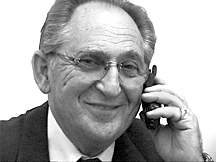
Aba Naor, my childhood friend, with his ever present cell phone. Herzelia Israel, April 2000. We, along with Uri Chanoch in the next picture, have come a long way together. Our friendship started in the Kovne ghetto and continued at the notorious Dachau concentration camp. After our liberation by the US 522nd Field Artillery Battalion, we three made our way to Israel and fought in the War of Independence.
We are still the best of friends and live just a few minutes from one another.

Uri Chanoch, then a young fighter for Israel's independence. Uri is one of a small group of my cherished friends who survived the war and helped build the state of Israel.
The way I feel about them can best be described in a poem I wrote:
Together we lived in the shadow of beast, Where nothing human could exist. Together we froze, together we starved, Together we scrounged for a piece of bread. Together we strove to stay alive, Together we buried our piles of dead. Yet we few our spirits uncrushed, We rebuilt our lives and made it last. We raised from scratch new generations, And enriched the world and all its nations. . . .
For the full poem see my section of poems.
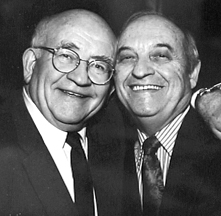
I met Ed Asner (the tough-talking Lou Grant on the Mary Tyler Moore show) in San Francisco on January 22, 1995, when we shared the stage at the Herbert Theater to honor Chiune Sugihara, the Japanese diplomat who risked his life to save Jews.
In August 1940, Chuine Sugihara was the Japanese Consul-General to Lithuania. He asked Japan three times if he could sign exit visas for Polish Jews, and was denied each time. He signed the visas anyway. Chuine and his wife Yukiko saved the lives of over 6,000 Jews from certain death in the Holocaust.
I was very impressed with Ed's sincere interest in honoring the Sugiharas and his personal friendliness and warm personality. He told me that we both have the same roots, as his family comes from Aishishok Lithuania.
In 1995 Ed won the B'nai B'rith Youth Organization Alummnus Award, and said this in part of his speech:
"Finally, after years of watching and admiring others for standing up, I was convinced of the fact that, as Hillel voices it, 'If I am only for myself, what am I?' I owed it--to myself, to my society, my world -- to become active. As an actor, as a citizen, but especially as a Jew," he said. "The days we live in are not as severe as the days of the Holocaust, but there are still genocides going on around us -- in Rwanda, Bosnia -- still prejudice and hate. And in many parts of the world, certainly here in the United States, young people are becoming increasingly seduced by drugs, alcohol and criminal behavior. We are again in times where we cannot afford to do nothing, and I'm sure you're finding that out."
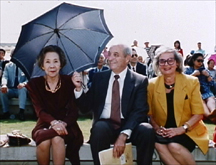
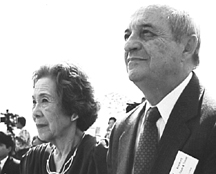
Two photos of myself with Mrs. Yokiko Sugihara in Yaotzu, Japan.
In 1994 the "Hill of Humanities" was inaugurated in the memory of her late husband, the great Japanese humanitarian, Chiune "Sempo" Sugihara.
Mrs.Yokiko Sugihara honored me by asking that I sit at her side. As this was an exceptional hot day with the sun shining down on our heads, I was being a gentleman and covered her with an umbrella. My wife Pola sits on my left.
I met Chiune Sugihara on Hannuka in 1939, when as an eleven-year-old I bumped into him at my aunt Anushka's gourmet shop in Kaunas, Lithuania. Hearing that I needed money to see a movie, he declared himself my uncle and gave me the price of admission.
In return, I invited him to our family's Hannuka party. I didn't know at that moment that he was a Japanese diplomat on a special mission to Lithuania. To everyone's surprise, he came to the party with his family.
Thus began an unlikely friendship between an eleven-year-old Jewish boy and a Japanese diplomat. I would frequent the Japanese consulate, which was not too far from where we lived, and Sugihara would often give me envelopes stuffed full of Japanese stamps (I was an avid stamp collector).
Mrs. Sugihara would give me cookies and tea and I would play with their small children. It was six months later that we found out what a great humanitarian we had for a friend when Chiune Sugihara began distributing visas to Jewish refugees from Poland. He saved thousands of lives, whereas all the Western consulates flatly refused to give visas to the Jews.
Many years later Mrs. Sugihara wrote: "Chiune Sugihara's decision to issue visas may have been influenced by an eleven-year-old boy named Solly Ganor." The full story is in my book, "Light one Candle."
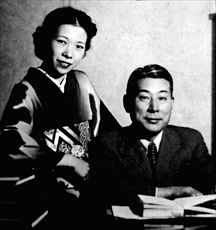
This is Yokiko and Chiune Sugihara as I remember them in 1940.
